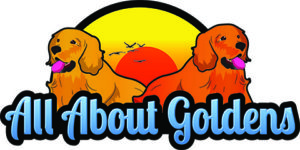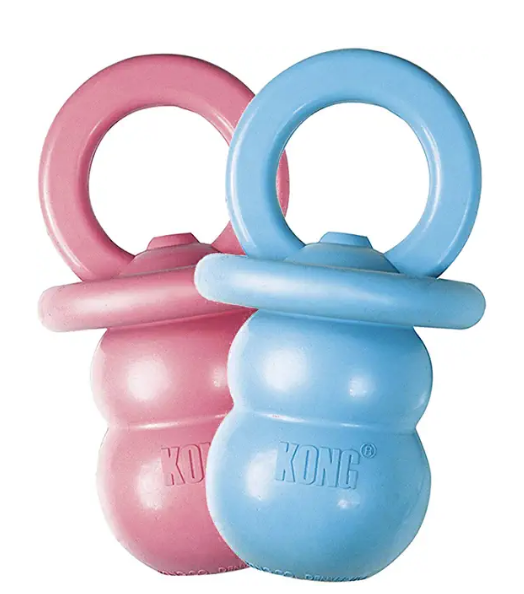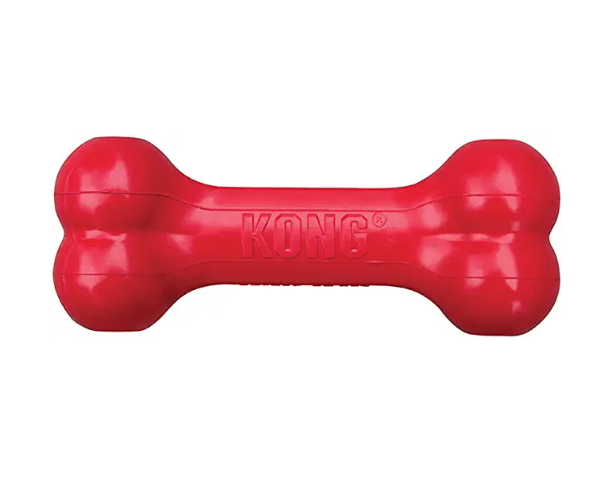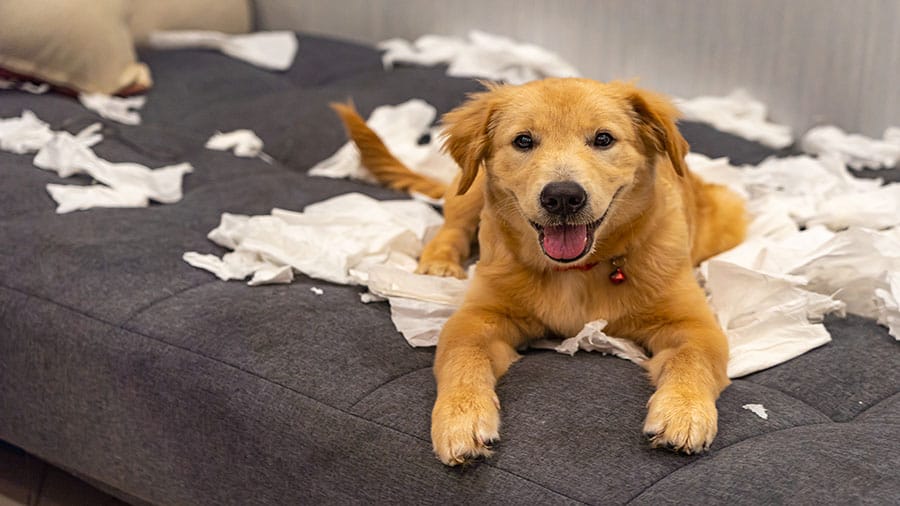
While everyone understands puppies chew in their teething stage, most will be surprised how much a puppy chews and how long the teething stage lasts. Puppies can be quite destructive in this stage. So, when will my golden retriever stop destructively chewing everything?
Golden Retrievers stop chewing around 2 years old. Even then, some dogs will continually chew throughout their life. Of course, with any dog chewing will be a lot less by the age of 2 than a puppy. Destructive chewing is a stage that most dogs will overcome with the correct training.
Although it seems logical to try and train your puppy not to chew, there are benefits for your dog to form a good chewing habit. Yes, that’s right. We want our dogs to chew. The key is training your dog what not to chew and what to chew.
Below we will go over the stages of chewing and why your puppy needs to chew.
Table of Contents
Baby Teeth
By the time you get your puppy home at eight weeks, they will have 28 razor-sharp teeth.
These are commonly referred to as milk or baby teeth. These teeth have sharp tips that will somewhat become smoother through chewing. So let the chewing began.
This is what no one told you.
The real chewing starts when your puppy loses their baby teeth.
Adult Teeth
Around 4 months of age, your puppy will enter their most active stage of chewing.
This is because they are cutting their adult teeth. The pain and discomfort from their adult teeth erupting through the gums make them chew on everything.
At the end of this stage, around two months, your dog will have 42 adult teeth. The permanent teeth are not as sharp as the baby teeth, but your puppy will continue to chew.
.
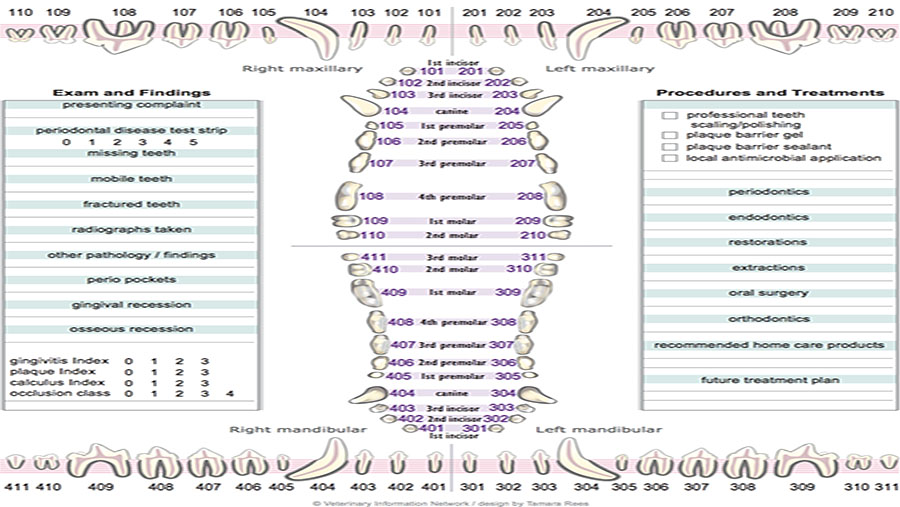
Adolescent Chewing
Your puppy has cut their permanent teeth at this stage. You may be thinking the chewing is over since pup has all their adult teeth.
Wrong.
This can be one of the most active phases of chewing. The dog’s adult teeth require setting into the jaw which is done by, you guessed it, some hard chewing.
Your dog will also experience exploratory chewing at this stage. This will amp up the chewing and mouthing due to puppy’s desire to explore its environment.
Benefits of chewing
Chewing is good overall dental health for dogs.
Dogs that don’t properly chew as a pup may have poorer dental health for life. Have you ever seen a dog with dirty, infected teeth that will require lots of dental work.
Chewing allows your dog to explore new things it will also keep their teeth clean and relieve the pain from teething. This is why you want your dog to chew on the appropriate toys of course. Teaching your dog to chew their toys instead of your stuff is key.
During the most active chewing stage, remember to offer new exciting toys often. Or you can rotate the toys you have.
This will keep them interested in their “new” toy keeping them from turning on to your stuff.
Teething Pain
Remember all this teething is quite painful for the puppy. This is the whole reason for chewing everything in sight.
It is just like a teething baby; they cry, chew, and drool until the teething stage is over. So remember when you find your puppy chewing on something that they are already in pain and don’t need to be punished.
Simply give them something adequate to chew. You can try wetting a cloth freezing it for your puppy to chew on while under supervision.
Don’t play the game
Don’t turn the chewing into a game. We are often bad about this by not realizing how our dogs are reading us. If your dog grabs your $200 shoe and you go to grab it from your dog, and the dog runs. Well, if you chase your dog, they will simply think you are playing the game.
Instead of running after your dog, run for the treats and call your pup over, give your dog the drop it, and leave it to command before giving the treat. It’s likely when your pup spotted the treats the shoe left their mouth already.
Running after your puppy to take something our of their mouth is a classic move but your puppy totally sees it as mom or dad playing with them.
What to do if your puppy chews something
When you come home and find that your dog has chewed your sofa or your most expensive pair of Nikes, well, let’s face it; it’s natural to want to punish the dog.
Unfortunately, your dog will not be able to make the mental connection between chewing your sofa or shoes at 12 pm and you coming home mad at 4pm.
If fact, if you decided to punish the dog, you could induce the behavior by causing anxiety for the dog.
What not to do
Do not punish your dog.
If your dog is feeling cornered or fear, you are putting yourself and the dog into a difficult situation. All bets are off on how the dog may react.
Some dogs will be submissive, but some will act in a defensive manner out of fear.
This is not where you want to go with your pup and can ruin their loving temperament.
How to fix it
The dog has no earthly idea why you are mad, so its best to let what is done be done and prepare a safe area for the dog or remove the items the dog likes to chew.
Let’s go over more tips to correcting destructive chewing.
Chew Toys
Golden Retrievers need to chew toys that are of good quality and safe for their chewing habits. Having plenty of chew toys throughout the house is ideal. Rotating your dog’s chew toys will help keep their interest in the toy.
Top chew toys for golden retriever puppy
Pick Up
One of the simplest things you can do before your puppy comes home is to look around the house and think like a puppy.
What looks good to chew on?
Anything small or low to the ground on a table or shelf will be fair game. Also, keep in mind of small things your puppy can chew and cause harm to themselves.
Ensure all electrical cords have protectors on them or put them out of the puppy’s reach.
Other items of interest that are usually within your dog’s reach are phone charges or video gaming controllers or cords. It’s quite upsetting when you want to play your gaming console, and your cables have been chewed or need to charge your phone to find out your puppy has also destroyed it.
Also, garbage cans will be a big hit with your dog. Getting a can with a lid that stays closed will help keep your puppy from investigating what’s inside the garbage can.
Suppose your someone who leaves socks or shoes around getting a puppy will undoubtedly train you to pick them up. Leaving either in reach for your new puppy will be fair game to at least chew the ends of your shoestrings.
Preparing before you puppy comes home is best to avoid the chewing of any items.
Exercise
Getting your dog outside for regular exercise will help your dog with boredom chewing. So take your dog for a walk, play fetch, or allow a branch wrestling match. Giving your puppy an hour of some good exercise will help get your dogs pinned up energy out.
After some good exercise, your pup will surely be too tired to chew up anything.
Goldens also love mental stimulation; even though they are big and goofy, they are also brilliant dogs. Try an agility-training course or a puzzle toy to keep your dog’s mind active and, in turn, less chewing.
Safe Space
When your not home to supervise the dog, provide a safe area for the dog.
For short amounts of time, you may crate your dog, but if you are going to be gone long periods of time, a room that has a baby gate or using a puppy playpen.
If you are putting your puppy into a room that has a door, don’t be tempted to just shut the door and think all is good.
This will often lead to the dog developing chewing habits for the bottom of the door and the floor. Don’t make this mistake.
If you are putting your puppy in a room go with the baby gate allowing the dog to see through the doorway will help you avoid needing to replace a door and flooring.
This will help keep your chewing puppy safe, along with keeping your house safe. Your dog will not need to be confined forever, but sometimes this is the best choice while your puppy is learning and maturing.
No Chew Spray
Using a bitter spray is a great training tool for teaching your dog not to chew.
If you witness your dog chewing on and an item they are not supposed too. Grab your Bitter Spray, and a toy calmly approach your dog and spray the item they are chewing.
Use the command ‘leave it,” then redirect your dog’s attention to the toy to continue chewing. Then praise the dog and drawback, leaving your dog to chew on the toy.
After the fact
If you find your dog chewing something while you weren’t paying attention, it’s great to use it as a training session.
But your dog needs to be actively still chewing on the item. Once they have left it, you have missed your chance.
Punishing the dog will not teach them anything about destructive behavior. It’s best to use confinement and supervision so your dog is not in the position to chew items while you are not present to correct the behavior.
You will need to be consistent with this training over a period of time. This will help your dog form good chewing habits.
You do not want your dog to think all chewing is bad, this can lead to them hiding and chewing. So when using the method always approach your dog calmly as not to scare them.
Conclusion
Although the destructive chewing stage can last until the age of two.
If you stay consistent with redirecting the puppy to appropriate toys some dogs will stop destructive chewing by the age of one.
When this happens your dog’s attention will be focused on chewing their toys and not your stuff. If you have been using a safe space during the time your dog is unsupervised, you can start to give your dog a little more freedom in the house.
